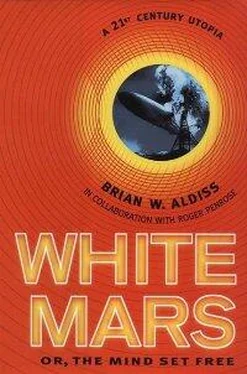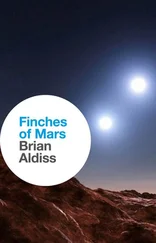Brian Aldiss - White Mars
Здесь есть возможность читать онлайн «Brian Aldiss - White Mars» весь текст электронной книги совершенно бесплатно (целиком полную версию без сокращений). В некоторых случаях можно слушать аудио, скачать через торрент в формате fb2 и присутствует краткое содержание. Год выпуска: 1999, ISBN: 1999, Издательство: Little, Brown UK, Жанр: Фантастика и фэнтези, на английском языке. Описание произведения, (предисловие) а так же отзывы посетителей доступны на портале библиотеки ЛибКат.
- Название:White Mars
- Автор:
- Издательство:Little, Brown UK
- Жанр:
- Год:1999
- ISBN:0-316-85243-0
- Рейтинг книги:5 / 5. Голосов: 1
-
Избранное:Добавить в избранное
- Отзывы:
-
Ваша оценка:
- 100
- 1
- 2
- 3
- 4
- 5
White Mars: краткое содержание, описание и аннотация
Предлагаем к чтению аннотацию, описание, краткое содержание или предисловие (зависит от того, что написал сам автор книги «White Mars»). Если вы не нашли необходимую информацию о книге — напишите в комментариях, мы постараемся отыскать её.
White Mars — читать онлайн бесплатно полную книгу (весь текст) целиком
Ниже представлен текст книги, разбитый по страницам. Система сохранения места последней прочитанной страницы, позволяет с удобством читать онлайн бесплатно книгу «White Mars», без необходимости каждый раз заново искать на чём Вы остановились. Поставьте закладку, и сможете в любой момент перейти на страницу, на которой закончили чтение.
Интервал:
Закладка:
“Of course, this creative process takes time. About ten billion years, in fact. Since we’re in an expanding universe, it follows that its size is a function of its age. So why is the observable universe fifteen billion light years in extent? Because it is fifteen billion years old.
“It seems unlikely, bearing these facts in mind, that life could have evolved elsewhere much earlier than it did on Earth. There are no Elder Gods.
“So why have we come into existence? Possibly because we are an integral part of the design plan of the universe. Not accidental. Not irrelevant!
“Each one of us is insignificant in him or her self. But as a species … Well, perhaps we should reconsider what a universe is, what it means. Without itself being conscious, it may need a consciousness fully to exist.
“By coming to Mars, we may be enacting the first minute step of a vast process. Whether we are up to seeing the process through, well…”
“Quite, quite,” agreed Ben, hastily. “Mmm. Well… Let’s see…”
That was one of the things which set the wonderful Tom Jefferies apart. He could always hear two opposed tunes playing and make harmony from them, possibly because he had trained himself to think of unimaginably distant futures.
Of course I attended Antonia’s memorial service. I was full of grief—hers was the first death on Mars, and a man wrote an elegy on it.
At the time of the EUPACUS collapse, when we found we were stuck on the Red Planet, all hell broke loose. There was rioting, and I was witness to one incident that Tom quelled with a quick answer.
An idiot was trying to incite violence, shouting out that they must destroy the domes. “We’ve been lied to. Our lives have been stolen. What they call civilisation is just a sham, a stinking sham. There’s no truth—it’s all a lie. Burn the place down and have done, it’s all a big lie. Everything’s a lie!”
Tom stood up, saying loudly, “But if that were true, then it would be a lie.”
Silence. Then strained laughter. The crowd stood about uneasily. The orator disappeared. The domes were not destroyed.
It must be admitted, I was in despair; I was really scared of being stuck on Mars for any length of time. I took a buggy from the buggy rank without authorisation and made off into the steeps of Tharsis to hide myself away, to commune with myself, to adjust. Although I spoke with my Other, she was a nothing, a green weed floating under water. When night was coming on, I parked myself on the edge of a gully and watched darkness gather, comforted in a way by its remorseless advance, as death had advanced on Antonia.
Whatever you do, I thought to myself, the darkness is always encroaching.
A wind rose. A dust storm brewed up from nowhere. Sudden gusts slammed against my vehicle. It seemed to stagger. Then it was falling over and over, down the gully. I struck my head on a support and became unconscious, although curiously aware all the while.
In that trance-like state, the person with whom I was closest came to stand by me. She sat in a room with a wide window overlooking the Pearl River and unbound her piled dark hair. This she shook out in a dark shower, to show that she knew of my ill fortune and grieved for me.
In her hands she held a silver carp, the meaning of which I did not understand. The carp swam from her grasp, through the pure air.
When my senses returned I was confusedly aware of a pain and a light. The pain came from my right leg—or was it coming from the pinpoint of light glaring at me over a shoulder of Tharsis? Waves of pain prevented me from thinking coherently.
Eventually I managed to drag myself up. Then I realised that the light I had seen was Saturn, shining low over the rock. The buggy lay on its side against a cliff. By good fortune, it had not cracked open during the drop, or I would have died from lack of oxygen while senseless.
Yet I might as well have been dead. My trip having been unauthorised, I had no radio with which to summon help. Nor had I a suit in which to attempt to extricate myself. Could I have climbed into a suit? That was doubtful with my ruined leg. I could do nothing but crouch there, waiting to die.
But the Martians look after their own. They had instituted a search once the buggy had been reported missing. When the dust storm died, they were out in strength.
I became hazily aware of a noise overhead. A man was scraping the dust away from a side window and looking down at me. I could not recognise his face, and fainted away.
When I roused, I was in a hospital bed, in the Reception House, coming round from anesthesia. A handsome but stern woman bent over me. Gently brushing my forehead with her hand, she said, “You see, it was irrational to take out an unauthorised buggy, wasn’t it?” Those were the first words Mary Fangold ever said to me.
Only later did I find that my shattered right leg had been removed and a synthetic limb grown in its place.
Now I understood the meaning of the silver carp that my dear friend had shown me in a dream. It swam away from her to indicate that one could live well without legs.
Tom Jefferies came to visit me every day. It was he who had discovered me, trapped in my stolen buggy.
Perhaps he felt he had been given my life to compensate for the loss of Antonia’s. I loved him platonically. It was like a fairy tale. I clung to him. I could not let him out of my sight; he was to me the father and mother I had never had.
When I was out of hospital, I besought him and besought him, as a man of destiny, to let me love him and look after him. So I became his adopted daughter, Cang Hai Jefferies.
And all this time—little though I realised it—Tom was planning a constitution for Utopia, and holding discussions with people every day.
6
Stranded on Mars! Although I wished only to mourn the death of Antonia, some force within me insisted that I should turn to the future and face the challenge of existence on a Mars isolated for an indefinite period.
This necessity became more urgent when we were confronted by a wave of suicides. There were those whose spirit was not strong enough to face this challenge. Whereas I saw it as an opportunity. Perhaps it was curiosity that drove me on.
Taking command, I ordered that there should be only one memorial service for all suicides, which numbered thirty-one, the majority of them single men in their thirties. I viewed the act of despair with some contempt and saw to it that the memorial service was kept short. At its conclusion the corpses were consigned to the biogas chambers below ground.
“Now we are free to build our future constructively,” I declared. “Our future lies in operating as a unit. If we fail to cooperate—zero future!”
The strange airless landscapes beyond our domes had only a remote relationship with our existences; our task was to make good what was inside, not outside, the domes. And since I had taken command—though not without opposition—a grand plan developed slowly in my mind: a plan to transform our society, and hence humanity itself.
I called people together. I wanted to address them direct and not through the Ambient.
“I’m going to kick down a rotten door. I’m going to let light in on human society. I need your help to do it.” That’s what I said. “I’m going to make us live as we dream of being—great and wise people, circumspect, daring, inventive, loving, just. The people we deserve to be.
“All we have to do is dare to throw away the old and difficult crooked ways and leap towards the new and difficult and wonderful!”
I was determined that the collapse of EUPACUS and our subsequent isolation on Mars—for however long that might be—should not be viewed negatively. After the considerable sacrifices everyone had made to reach the Red Planet, we had to struggle to exist, to prove something. With the death of my beloved wife, I decided I would never leave Mars, but remain here all my days, finally to mingle my spirit with hers.
Читать дальшеИнтервал:
Закладка:
Похожие книги на «White Mars»
Представляем Вашему вниманию похожие книги на «White Mars» списком для выбора. Мы отобрали схожую по названию и смыслу литературу в надежде предоставить читателям больше вариантов отыскать новые, интересные, ещё непрочитанные произведения.
Обсуждение, отзывы о книге «White Mars» и просто собственные мнения читателей. Оставьте ваши комментарии, напишите, что Вы думаете о произведении, его смысле или главных героях. Укажите что конкретно понравилось, а что нет, и почему Вы так считаете.










